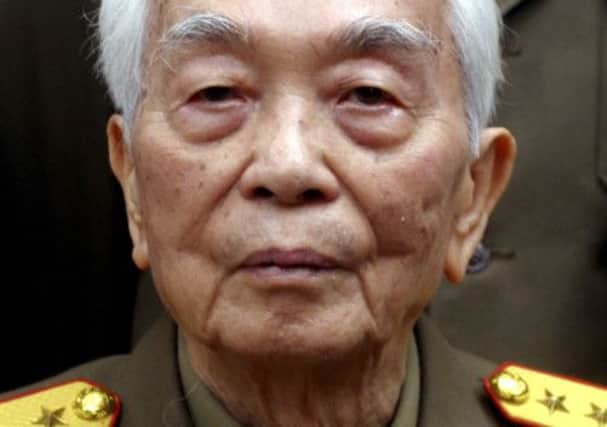Vietnam: General Vo Nguyen Giap dies aged 102


The general was one of Vietnam’s best-known 20th-century figures. The son of a peasant scholar, the so-called “red Napoleon” stood out as the leader of a ragtag army of guerrillas who wore sandals made of car tyres and lugged their artillery piece by piece over mountains to encircle and crush the French army at Dien Bien Phu in 1954. The unlikely victory, which is still studied at military schools, led not only to Vietnam’s independence but hastened the collapse of colonialism across Indochina and beyond.
Giap went on to defeat the US-backed South Vietnam government in April 1975, reuniting the country.
Advertisement
Hide AdAdvertisement
Hide AdHe died yesterday evening after several years in a Hanoi military hospital.
Giap was known for his fiery temper and as a merciless strategist, but also for being a bit of a dandy. Photos show him reviewing his troops in a white suit and tie, in sharp contrast to Ho Chi Minh, clad in shorts and sandals.
Giap never received any formal military training, joking that he attended the military academy “of the bush”.
Against American forces with sophisticated weapons and B-52 bombers, Giap’s forces prevailed. But more than a million of his troops perished in what is known in Vietnam as the “American War”.
“We had to use the small against the big – backward weapons to defeat modern weapons,” Giap said. “At the end, it was the human factor that determined the victory.”
In a 2004 interview, the old warrior preached peace and said Vietnam’s independence wars were a “victory for colonised countries all over the world”.
Giap recalled that on a visit to the United Nations in Geneva the previous year, he was handed a book to sign.
“I wrote… and signed Vo Nguyen Giap, General of Peace.”
Born on 25 August, 1911, in central Vietnam, Giap was a close friend of the late revered president Ho Chi Minh and was held in high regard, alongside former prime minister Pham Van Dong.
Advertisement
Hide AdAdvertisement
Hide AdAt Dien Bien Phu, his Viet Minh army surprised elite French forces by surrounding them. The Vietnamese dragged heavy artillery over steep mountains and slowly closed in during the bloody, 56-day battle that ended with French surrender on 7 May, 1954.
“If a nation is determined to stand up, it is very strong,” Giap said in 2004, prior to the battle’s 50th anniversary.
But Giap’s critics and his nemesis, the late US General William C Westmoreland, said he was effective partly because he was willing to sustain huge losses.
“Any American commander who took the same vast losses as General Giap would have been sacked overnight,” Westmoreland was quoted as saying in Pulitzer Prize-winning author Stanley Karnow’s 1983 book Vietnam. A History.
Karnow wrote that Westmoreland seemed to misunderstand how determined the communists under Ho and Giap really were.
Giap is known to have opposed several important military decisions, including the costly move in 1968 to delay the withdrawal of forces from unsustainable positions in South Vietnam.
Later, he opposed Hanoi’s decision to maintain an occupying force in Cambodia following Vietnam’s 1978 invasion.
This, coupled with long-harboured resentment by some members of the establishment towards him, is said to have contributed to his declining political influence after the war years.
He remarried after his first wife died in a French prison in 1943. Giap had three daughters and two sons.